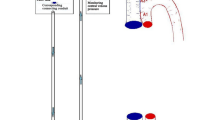Abstract
The effects of total ischemia on the energy state of the brain are well documented. These changes consist in a rapid disappearance of available substrates (glucose and glycogen) and of high energy compounds (phosphocreatine and ATP), and in an accumulation of AMP, inorganic P (Pi), and lactate. The magnitude of the increase in the lactate concentration is determined by the pre-ischemic levels of glucose and glycogen which usually suffice to increase the tissue lactate content from about 1.5 to about 15 mMoles/kg of wet tissue. The increase in lactate is maximal within a few minutes of ischemia. Therefore, 3–5 min of total ischemia leads to a state of severe and maximal tissue acidosis and of complete energy depletion [1, 2, 3, 4, 5, 6].
Supported by grants from the Swedish Medical Research Council (Project No. B 72-14 X-2179-04 and B72-14X-263-08B), from the Swedish Bank Tercentenary Fund, and by U.S. PHS Grant No. 5 R01 NS 07838-03 from NIH.
Access this chapter
Tax calculation will be finalised at checkout
Purchases are for personal use only
Preview
Unable to display preview. Download preview PDF.
Similar content being viewed by others
References
Thorn, W., Scholl, H., Pfleiderer, G., Muldener, B.: Stoffwechselvorgänge im Gehirn bei normaler und herabgesetzter Körpertemperatur unter ischämischer und anoxischer Belastung. J. Neurochem. 2, 150–165 (1958).
Lowry, O. H., Passonneau, J. V., Hasselberger, F. X., Schultz, D. W.: Effect of ischemia on known substrates and cofactors of the glycolytic pathway in brain. J. biol. Chem. 239, 18–30 (1964).
Schmahl, F. W., Betz, E., Talke, H., Hohorst, H. J.: Energiereiche Phosphate und Metabolite des Energiestoffwechsels in der Großhirnrinde der Katze. Biochem. Z. 342, 518–531 (1965).
Müller, U., Isselhard, W., Hinzen, D. H., Geppert, E.: Regionaler Energiestoffwechsel im Kaninchengehirn während kompletter Ischämie in Normothermie. Pflügers Arch. ges. Physiol. 320, 168–180 (1970).
Maker, H. S., Lehrer, G. M.: Effect of ischemia. In: Lajtha, A. (Ed.): Handbook of Neurochemistry Vol. 4, p. 267–310. New York: Plenum Press 1970.
Siesjö, B. K., Plum, F.: Pathophysiology of anoxic brain damage. In: Gaull, G. (Ed.): Biology of Brain Dysfunction. New York: Plenum Press. (In press 1972.)
Weinberger, L. M., Gibbon, M. H., Gibbon, J. H.: Temporary arrest of the circulation to the central nervous system. Arch. Neurol. Psychiat. (Chic.) 43, 961–986 (1940).
Hirsch, H., Euler, K. H., Schneider, M.: Über die Erholung und Wiederbelebung des Gehirns nach Ischämie bei Normothermie. Pflügers Arch. ges. Physiol. 265, 281–313 (1957).
Schneider, M.: In: Gastaut, H., Meyer, J. S. (Eds.): Cerebral Anoxia and the Electroencephalogram, Chap. 13. Springfield, Ill.: C. C. Thomas 1961.
Müller, U., Isselhard, W., Hinzen, D. H., Geppert, E.: Electrocorticogramm und regionaler Energiestoffwechsel des Kaninchengehirns in der postischämischen Erholung. Pflügers Arch. ges. Physiol. 320, 181–194 (1970).
Ames, III, A., Wright, R. L., Kowada, M., Thurston, J. M., Majno, G.: Cerebral ischemia. II. The no-reflow phenomenon. Amer. J. Path. 52, 437–454 (1968).
Chiang, J., Kowada, M., Ames, III, A., Wright, R. L., Majno, G.: Cerebral ischemia. III. Vascular changes. Amer. J. Path. 52, 455–476 (1968).
Cantu, R. C., Ames, III, A.: Distribution of vascular lesions caused by cerebral ischemia. Neurology 19, 128–132 (1969).
Hossman, K.-A., Sato, K.: Recovery of neuronal function after prolonged cerebral ischemia. Science 168, 375–376 (1970).
Hossman, K.-A., Olsson, Y.: Suppression and recovery of neuronal function in transient cerebral ischemia. Brain Res. 22, 313–325 (1970).
Kramer, W., Tuynman, J. A.: Acute intracranial hypertension — an experimental investigation. Brain Res. 6, 686–705 (1967).
MacMillan, V., Siesjö, B. K.: Brain energy metabolism in hypoxemia. Scand. J. clin. Lab. Invest. (In press 1972).
Atkinson, D. E.: The energy charge of the adenylate pool as a regulatory parameter. Interaction with feedback modifiers. Biochemistry 7, 4030–4034 (1968).
Author information
Authors and Affiliations
Editor information
Editors and Affiliations
Rights and permissions
Copyright information
© 1972 Springer-Verlag Berlin · Heidelberg
About this paper
Cite this paper
Ljunggren, B., Granholm, L., Schutz, H., Siesjö, B.K. (1972). Energy State of the Brain during and after Compression Ischemia. In: Brock, M., Dietz, H. (eds) Intracranial Pressure. Springer, Berlin, Heidelberg. https://doi.org/10.1007/978-3-642-65486-2_16
Download citation
DOI: https://doi.org/10.1007/978-3-642-65486-2_16
Publisher Name: Springer, Berlin, Heidelberg
Print ISBN: 978-3-642-65488-6
Online ISBN: 978-3-642-65486-2
eBook Packages: Springer Book Archive



